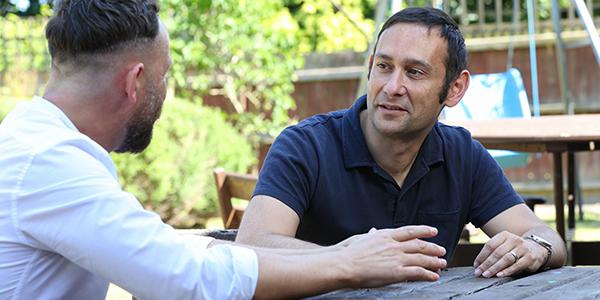We need to talk about mental health
Richard, our chief executive, writes about his relationship with mental health as we start the new year.
Please note this story contains descriptions of depression.

This January, we are focusing on mental wellbeing across Sense. As chief executive, I feel that I have a responsibility to start and continue the conversation about mental health and raise awareness of the issue.
This blog is about my history of depression, my recovery and how it has made me a stronger and better leader. I hope it lets people know that they are not alone, that they can talk about their mental health problems, and how to manage them.
Twenty years ago, every morning when I woke up, the first thing I used to think about was the battle with my depression and how I would navigate each day.
Why did I feel depressed? The causes of my mental health problems came from a range of factors, rather than one specific moment, or a particularly traumatic event in my life. Growing up without feeling loved, nurtured or praised left me with so much self-doubt. I also struggled with my identity and a sense of shame. I turned inward upon myself.
Throughout my adult life, I felt like I was walking a tightrope but constantly looking down. Too scared to walk forward with any purpose, nervous of imaginary obstacles and slippery surfaces. Leaning too much inward. Unable to balance all the different aspects of my life. An overwhelming sense that there was little support around me. Always one step away from a fall.
No one knew that I was depressed. I became very adept at hiding my moods at the office, acting in a role that I wanted or expected others to see. I went to work, got on with my job, and maintained work relationships. Going through the motions, progressing my work career, moving upward, but feeling increasingly anxious and ill inside.
But then the cracks began to show. My depression began to interfere with my day to day life. Pretending to be something I was not and trying constantly to avoid negative feelings was very draining. I found it increasingly harder and more challenging to keep things in perspective.
I was also not being honest about myself.
I got more frustrated with other people at work, becoming extremely self-critical of my own performance, berating myself over my perceived failures, obsessively replaying conversations in my mind, and feeling more and more paranoid when interacting with others.
Things spiralled further when my dark moods became increasingly severe. I constantly linked a bad day at work to everything that had gone wrong in my childhood. I dwelt on all the many things that hadn’t gone to plan. I compared myself to others, even strangers in the streets, imagining their seemingly perfect lives in comparison to mine. I became increasingly superstitious; the days would be fine but only if I followed particular rituals or said/didn’t say certain things.
Then I fell off the tight rope.
I disconnected from the world around me
Crying uncontrollably at home. Finding it hard to get out of bed in the morning. Feeling listless and removing myself from others. Disconnecting from the world around me. I needed help.
In retrospect, it was a huge shame that I didn’t seek help years earlier, but at that time, nobody talked about their mental health issues. I didn’t think it was acceptable to tell anyone how I was feeling. It’s vital that we change attitudes so everyone feels able to talk openly.
It has taken many years but I have now recovered. I have benefited from the help of two very talented therapists, my loving and constantly reassuring partner, and medication. I have been able to build up my self-worth and self-love, no longer held back by my childhood.
These days, mostly, I see a bad day for what it is: a temporary feeling, to be expected and not a major setback in my life. These are normal changes in mood, not an indication that things are going to get worse. It is really okay to not be okay and have a bad day.
I try to keep a sense of perspective and keep my thoughts in the moment rather than looking backwards and getting lost in the mind maze of the past, or worrying about what may or may not happen in the future. One bad day at work is one day during a whole career where things have gone pretty well.
I have built up some solid defences and learned a few accessible tools to keep the depression at bay.
I practice mindfulness meditation. I’ve used a meditation app, Headspace, for the last decade and that gives me a stronger foundation and the techniques to help me deal with stress.
Meditation can help prepare me for difficult meetings or conversations. Remembering to breathe properly is such a powerful technique to slow down the world around you and stop those negative thoughts from taking on a life of their own.
Building running into my daily routine helps to lift my mood, and emotional and physical wellbeing.
Keeping busy at work is very good for my wellbeing. But I am aware that my mood deteriorates when I first take time off work. Perhaps I don’t have enough hobbies to occupy my brain and distract my mind outside of work. That empty feeling of not being good enough sometimes reappears. Learning that it’s good to have a go and try new things is important if you want to live a happier life.
Now I know that the painful experiences of the past can also form the bedrock for new strengths of leadership. Being acutely aware of yourself means you are also intuitively aware and have a deeper understanding of the abilities and needs of others.
I recognise the importance of checking in with colleagues if they don’t seem okay. I know the signs so that makes me well placed to reach out to others. I make a point of telling people about my lived experience of depression when they confide in me about theirs. No one should feel alone. I never push it but I do let people know that there is support out there.
Above all, my history of depression allows me to be more aware, emphatic, kind and compassionate towards others. Valuing others, their differences and strengths is a positive mindset. Living with these values is also good for my mental health. My experiences have made me a stronger and more authentic leader.
Thankfully, I haven’t felt depressed for more than ten years. Today, I can walk across the tightrope and get to the other side. I feel very proud of myself and what I have achieved in life.
If you’re struggling to manage your mental wellbeing, there are organisations that can help any time of day. Here are some examples of organisations that are there for you:
Samaritans
Available 24 hours a day, 365 days a year. Contact Samaritans any time, for free. Whatever you’re going through. Call 116 123 for immediate help. You can also email [email protected] and they’ll get back to you in 24 hours. Or contact them through Next Generation Text using 0330 094 5717.
Shout Crisis text line
Text ‘Shout’ to 85258 for help in a crisis at any time via text messages. It’s free.
NHS urgent mental health helpline
If you live in England, you can find an NHS mental health helpline. They provide 24-hour advice and support for you or someone you care for. Find a helpline on the NHS website.
Mind
Find information and support online from Mind, including things like everyday living and details of types of mental health problems.

